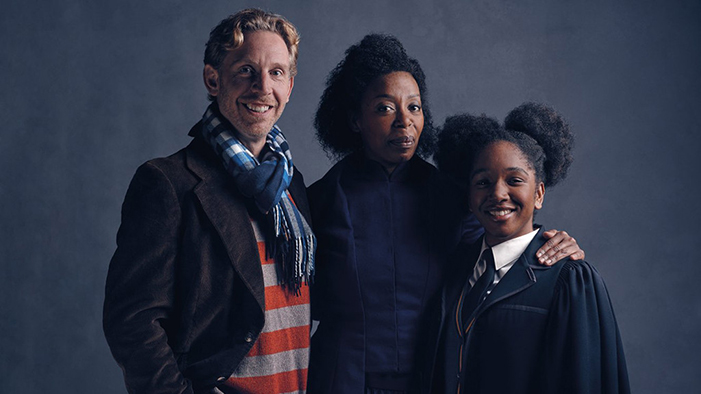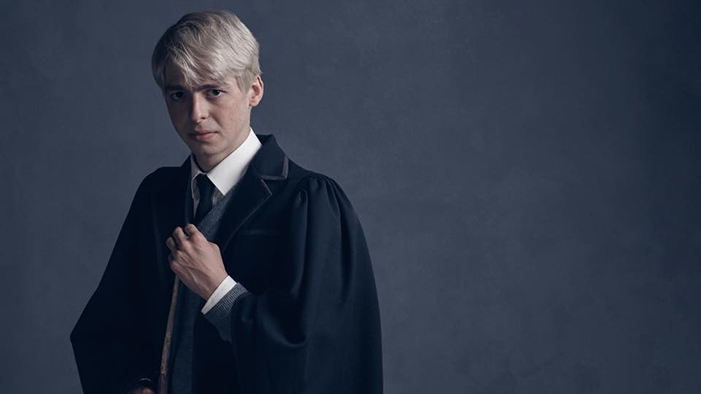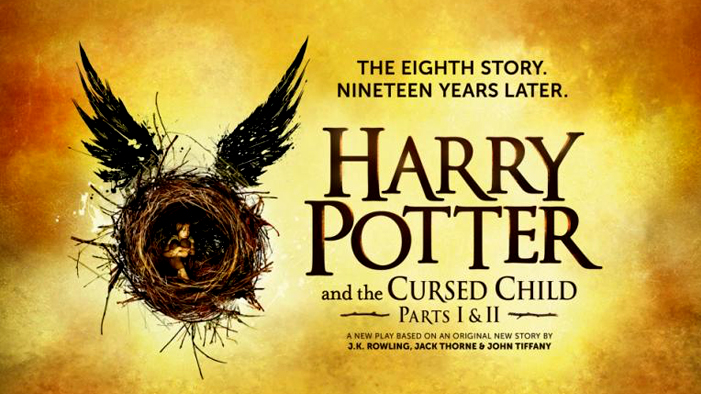Harry Potter and the Cursed Child‘s Secrets REVEALED
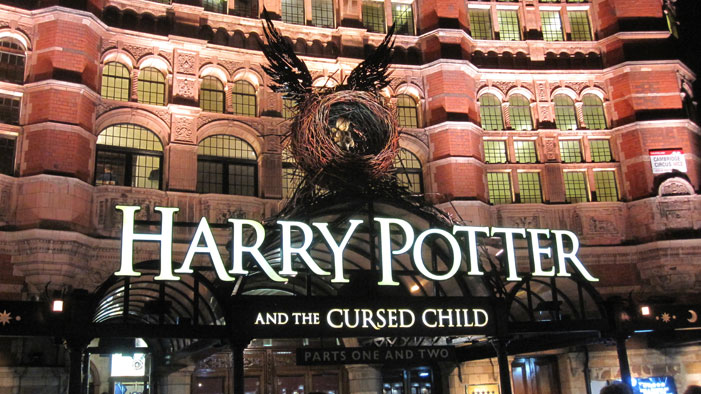
Before seeing Harry Potter and the Cursed Child in London, part of me was fairly uncomfortable with the idea of not “Keeping the Secrets.” After all, who am I to disobey a direct order from J.K. Rowling herself? But having ventured inside The Palace Theatre for parts one and two of the play of a lifetime, I’m a bit relieved to say that there truly is only so much I can reveal, because I have no idea how most of the magic, the production trickery and theatrical illusions were accomplished. That said, I am here to describe to you the absolutely smashing experience I had in as much detail as is humanly possible so that you, too, can feel that you’ve grabbed a hold of a Time Turner and ventured into Harry Potter: the Do-Over Chronicles.
***Although listen up, guys, I’m super going to spoil the plot. So don’t read this if you haven’t read the script.***
Got a seat? Ordered something from the trolley witch? Let’s go…

The Pre-Game
I was one of the people who foolishly, ever-hopefully, ridiculously bought a ticket for Harry Potter and the Cursed Child almost a year ago. That’s right, I spent money on a show in a country that I do not live in that I had no guarantee I would be able to attend. To my credit, I did buy the cheapest ticket, knowing in all likelihood that I wouldn’t be able to work out a trip to London to fulfill my dorkiest of Harry Potter dreams. But as the date drew closer and HPATCC tickets continued to sell out through the end of 2017, I realized I would REALLY regret not using my own version of a golden ticket.
So I did what any Quidditch-mad punter with a shot at attending the World Cup would do: I booked my flights and a very cheap, very cramped, 12 Grimmauld Place-esque hotel, and began to plot. First off, I had an important decision to make: To read the script of Harry Potter and the Cursed Child before I saw the performance or to try and remain spoiler-free until I stepped into the hallowed halls of London’s Palace Theatre. I decided that if I was going on this insane trip, I should do it right, and maintain a mindset naive to the surprises of Cursed Child. This involved me keeping my ears packed away like Quaffle balls as my friends raged on about the eighthHarry Potter story for the entirety of August.
On the big day, I picked up my tickets from the box office (they really do look like Willy Wonka’s golden tickets) and queued up with the other buzzing fans waiting to get into the theater. We were advised that we should arrive an hour before showtime, so that we could go through security, make our way to our seats, and lay any and all stress eggs before curtains-up.
As I purchased the cheapest tier of seating, I was sent skipping off to the balcony section. Just 512 flights of steps and three heart attacks later, I was in my seat. The balcony was so steep that I felt if I didn’t hold onto my armrests as I peered down, I would certainly tumble forward and fall the fifty or so feet to my death. This just added to my excitement. Nothing could have dampened my enthusiasm. Even the fact that the stage was verrrry far away was of little concern. I was thrilled to find that there was a tiny pair of rental binoculars attached to the seat in front of me for one pound. With them in hand, I could now see each detail on stage, each prop and intricately designed piece of the set. I am a really big fan of binoculars after this revelation.
After sitting, I had nearly forty minutes to try and distract my brain from thinking too much about anything and also let every emotion wash over me like a tidal wave of butterbeer, delicious and terrifying. To survive the wait, I used my dear binoculars to examine each inch of the set. It was clearly King’s Cross Station. At the back of the stage was a transparent clock, with light shining through onto the floor. There were unaccompanied suitcases arranged on the platform in a haphazard way that would see them blown up by TSA robots, were it not the Wizarding World. An intricate arch sat above it all, featuring the phases of the moon. FINALLY, my life had reached its peak, and I could die knowing I had lived a full and nerdy existence: we were reminded to turn off our cell phones (dastardly Muggle contraptions!), and the lights went down.

Act One
Although the air supply at my spectating altitude was already pretty limited, the entire theater seemed to hold its breath in anticipation.
And then they were off.
A swirl of people making their way through a busy train station. Picking up suitcases, putting them down, flying (metaphorically, at this time) from one side of the stage to the other. And then there were the Potters. Before I could really digest that the fully grown man on stage was Harry Potter, and that the young boy on stage was not, we saw our first bit of magic. After the Potters ran towards Platform 9 and 3/4, all the actors on stage went from Muggle businesspeople and Muggle families to Wizards in cloaks getting ready to board the Hogwarts Express with just a twirl and flip of fabric. The audience let out a communal “ahhhh,” everyone’s teacups overflowing with excitement to be heading back to Hogwarts once again.
At first it was jarring to see my favorite trio of characters with their parenting hats on, but each of Ron’s somewhat-lame dad-jokes convinced me that these were in fact the characters I knew and loved, not strange amalgamations put on by fancy British theater actors who may or may not have read the books that I considered holy. It was odd but enjoyable to watch Harry, Ron, and Hermione become the cause of teen embarrassment—”Mum, I can’t give a professor love!”—and then pass the story off to their children.
The first few scenes flew by like a montage in a movie, and I tried to drink up every detail as the years tore by. Suitcases became trains and trains became The Great Hall. Each movement was perfectly choreographed so that you didn’t notice the transformation until it was complete, and then wondered how you could have seen something entirely different just seconds before. The center of the stage spun like a clock, and my brain was in overdrive, bouncing over the scenery and trying to catch each word uttered by these new and fascinating characters.
The most important introductions were of course to Albus Potter and Scorpius Malfoy, ascendant besties:
“ALBUS: So we need to choose now who to be friends with for life? That’s quite scary.”
Echoing Harry’s own eagerness to make friends with someone a bit on the outside on his first trip aboard the Hogwarts Express, Albus’s decision to sit with Scorpius is our first real indication as to the contents of his character. Unlike his father, Albus has a streak of slightly emo insecurity running through him. Watching this moody and defeated boy take on the leading role was definitely an adjustment when I was so used to steadfast, optimistic, and brave Harry running the story.
Despite being the center of the play, Albus was quickly overshadowed by Scorpius, who was an instant hit with the theater (and my favorite character by far). Scorpius’ over-enthusiasm, expressed in his cracking and desperate screech of a voice, and mixed with his complete lack of social grace, rang true and hilarious immediately. He endeared himself to me and the rest of the audience with his off-key and non-rhyming song, “Sweets, they always help you make friends.” Trust, you will love this kid.
Rose acted very much like an early Sorcerer’s Stone Hermione, with no shortage of judgement on hand, and wasted no time outing Scorpius as Voldemort’s son (pronounced the “correct” way, “Vold-a-more,” with a silent “t”)—a rumor that prompted an outpouring of sympathy for wee Scorpius from those around me. How could this pale teen, totally devoid of confidence and handing out sweets with an unsure smile, be the spawn of Voldemort? Rose immediately defused the tension, adding, “It’s probably rubbish. I mean… look, you’ve got a nose,” without which the audience may have never forgiven her hurtful words towards Scorpius. He was *that* beloved that quickly.
I mouth-breathed as Albus and Scorpius grew together through their adolescent trials, and as Albus and Harry grew miles apart during the intermittent holiday scenes. It was strange to sympathize with Harry and Albus as they traversed their sad, separate emotional landscapes: I understood Harry’s confusion that Albus didn’t love Hogwarts, and I understood why Albus struggled to feel at home in a place that refused to see him as anything other than Harry Potter’s son. It was an unbridgeable void; the “Cat’s in the Cradle” of stage moments. I mean we all knew the glorious time Harry had spent at school; we had been there with him. But it was very clear that Hogwarts wasn’t a dream for all of its students. I felt alllll their feels.
Harry as an adult was every inch the boy we knew him to be, unsure about a lot of things (like parenting), but boldly trying to keep calm and make the best of it.
And Jamie Parker cleverly took on many of the verbal patterns from Daniel Radcliffe’s performance so that you could hear the Harry Potter you knew, just with an older voice. When Harry loses his temper at an angsty Albus, you can’t help but recall the rash and angry young Harry yelling in frustration in Order of the Phoenix. Noma Dumezweni also fell into the role of Hermione easily, showing her intelligence and kindness from the start, although her Minister-for-Magic Hermione was more one-dimensional in her seriousness than I would have liked.
The introduction of Delphi was a curveball. While underdogs Albus and Scorpius felt familiar in a lot of ways, we had never had a cool, twenty-something girl in the series. With Delphi, I was thoroughly unclear on who this new Diggory was and what her purpose in the story might be. All I know is I liked her hair right off the bat.
I was swept away on a river of nostalgia (= barely controlled emotions) with Harry’s flashback dream to his eleventh birthday, a gigantic and slightly Jamaican Hagrid busting through the door bearing Harry’s life-changing news. And when the too-familiar rasp of Voldemort’s voice spread through the theater, my spine, along with everyone else’s, turned to Adamantium.
After the first couple of spells onstage (including actual fire appearing with an “Incendio!”), I had my binoculars at the ready to catch any up-close magic. In a wonderfully staged scene, Albus and Scorpius climbed on top of a speeding train (seemingly made of suitcases from the first King’s Cross sequence) as the wind rushed past them and a very disturbing trolley witch grew spikes for fingers. Elsewhere, the mayhem at St. Oswald’s Home for Old Witches and Wizards was an absolute fireworks display. So many elderly magicians casting this spell and that, the eye didn’t know where to look.
The polyjuice potion, while not the special effects marvel it was on film, was still impressive in the seamless transition from one actor to the other, with relatively little cover and no trace of where young Albus, Scorpius, and Delphi had disappeared to. One of the crowd’s favorite moments of magic happened shortly after when the three of them stepped inside the London telephone box to enter the Ministry: their cloaks swirled, and they vanished into nothing. No time to climb into a hidden door, just there one moment, gone the next.
It still boggles my mind to think how the actors playing Hermione and Harry managed to run behind her office door and then, seconds later, appear at the other end of the stage to make their entrance. (MY BRAIN IS BOGGLING EVEN NOW.) No matter how I squinted at the stage, the mysteries of magic remained just that, mysteries… and magic. Of course, it is entirely possible that I was laughing too hard at “Ron’s” suggestion of “a baby or a holiday,” to notice the tricks that were happening in front of my eyes.

Act Two
I was so dazed as the lights came up at the end of the first act that I stood up, prepared to leave the theater. I knew there was a Part One and a Part Two, but I had just witnessed SO MUCH, I assumed Part One had ended. Luckily, someone informed me that there was an entire other act to Part One. I spent the next fifteen minutes trying to prepare my brain for the onslaught of more life-changing information about the Potters by eating as many handfuls of theater popcorn as I could manage to stuff into my mouth.
For some reason, I hadn’t expected HPATCC to include any new information about the previous Harry Potter stories. So when small details, like the fact that ickle Harry used to wet the bed when having nightmares about his parents’ murder, were revealed, I felt like I’d taken a bludger to the gut. Luckily for my delicate emotional constitution, these revelations were usually followed by marvelous displays of magic. After Harry’s latest nightmare, we got our first look at floo powder travel on stage. The characters popped out of a fireplace in Headmaster McGonagall’s office like kids bouncing off the end of a slide at a playground, Draco landing gracefully with his ponytail still perfectly in place.
As I had decided that Scorpius was my protagonist of choice, my Sneakoscope began to whirl when Albus, crushing hardcore on Delphi, waved away any potential issues with their plan to alter time (what could go wrong?). My love for Scorpius multiplied with each dorky comment (“Okay, two points”), each darling observation (“She didn’t kiss me—did you notice?”), and each time he easily opened his heart to Albus (“You’re better. You’re my best friend, Albus. And this is mayhem to the nth degree.”). The light and sound work done to convey time travel was spectacular, and I studied it each time, trying to figure out exactly how they managed to shift perspective so thoroughly in just a few seconds. It was like a ripple hit the entire stage, momentarily moving each molecule and reassembling them.
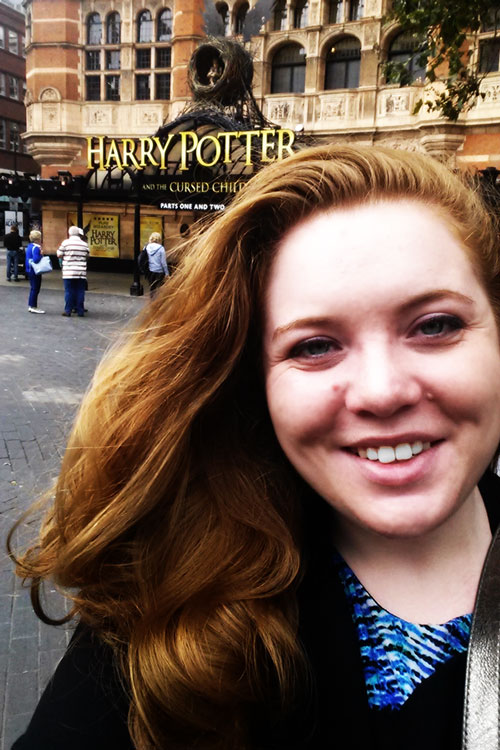
The writer, barely hanging onto her emotions outside the Palace Theater.
After Albus and Scorpius’ first trip back to the Triwizard Tournament in Goblet of Fire, I probably should have expected that Cedric wouldn’t be the only long-since-deceased character to make an appearance in the show. But seeing Dumbledore talking to Harry was an eerie and touching experience. Especially when I realized that run-ins with the dead were probably pretty commonplace through the magic of Wizard portraits. Even in his oil-painting afterlife, Dumbledore was still a vague and mostly unhelpful mentor.
The alternate reality was almost too much for my mind to swallow with its mind-mouth. I had just started to adjust to all the new characters and information, and suddenly everything had changed. After banning Albus from seeing Scorpius (BOO HARRY!) there was some wonderful staircase choreography demonstrating the physical and emotional ways Albus and Scorpius were moving apart. I ate up Draco’s touching protectiveness of Scorpius, as I always believed him to be much more of a hero than people gave him credit for in the original books. My faith in Draco appeared to be more and more justified as he talked about his jealousy of Harry’s close friendships (I mean, Draco had Crabbe and Goyle for crying out loud) and the insidious nature of loneliness:
“And being alone—that’s so hard. I was alone. And it sent me to a truly dark place.”
This is not to say that I didn’t thoroughly enjoy the long-brewing duel between Harry and Draco, which was a bit like a Cirque Du Soleil act with its multi-colored lights and high-wire acrobatics.
Albus and Scorpius’ reunion fight had me tangled up with sadness for Scorpius and overjoyed when Albus took some responsibility and started treating his gem of a friend with more love. When Albus and Scorpius entered the lake the second time to spoil Cedric’s crack at the Triwizard cup with an engorgement spell, an oblong frame was lowered like a curtain over the stage, showing the two of them midair, swimming through a blue background. A surprised Cedric then somehow went from normal-sized to a brilliant impersonation of Aunt Marge. Moments later, Scorpius appeared in an actual pool of water at the front of the stage, gasping for air. Everyone in the balcony section took their lives into their hands as they leaned forward to get a better view. And with everyone on the edge of their seats, Umbridge made her horrifying debut on stage to great outrage.
From the jumpy gasps throughout the theater, it was obvious that I was not the only one who had waited to see the story brought to life on stage before reading the book. All was not right in the Wizarding World and the air went from “standard over-air-conditioned theater temp” to “chilly Forbidden Forest after dark,” with dementors flying up among the rafters and down in the stalls, causing an actual panic to set in. I was so unsure of where they might appear next that I practically jumped from my seat when turning to check behind me.
As the new flags of Voldemort’s reign were revealed, Part One came to a close.
I left the theater thrumming with amazement and wondering how, suddenly, so many things could have entered the Harry Potter universe in so short a span of time. After a brief run around some tourist spots (including the INCREDIBLE House of MinaLima!), I arrived back at the theater to find that the merchandise had also done its own magic trick, switching out house colors for the new Voldemort paraphernalia. I made my slow trek back up to my seat, on edge and excited for what was to come in Part Two. It had all felt like too much, but also like it could never be enough.

Act Three
I know the new/alternate Hogwarts that Scorpius found himself in was horrible and dark, but I was fascinated by the entire realm. Just what did a world ruled by Voldemort look like? For one, the Voldy-friendly Hogwarts uniforms were stunningly fashion-forward. Scorpius continued to impress me with his complete dismissal of his popularity in alternate Hogwarts 2.0. Each time someone said, “For Voldemort and Valor,” you could feel the icy fear and disgust that ran through him and the audience. Even with a badass nickname and his pick of dates to the dance, Scorpius never faltered in his quest to restore the Wizarding World.
Snape’s appearance hit me harder than Dumbledore’s. After all, Dumbledore was in a portrait—this was a living, breathing Severus Snape. And he hadn’t just given in and gone full-blown Death Eater after Harry’s death; he had continued to try and help the rebellious Ron and Hermione. His return to Harry Potter was sorely welcome, and this Snape wasn’t just tragic and forlorn—he was funny. His dry sarcasm received boisterous laughter, making it all the more devastating to have to say goodbye again.
For some reason, I got the hang of this alternate reality a little bit more quickly. Perhaps the severe changes (i.e., VOLDEMORT WINS) were just easier to keep track of than the small alterations made in the first time jump. It was notably the most horrific act thus far, with more Dementors’ kisses than I ever hoped to see. The hooded creatures descended on Hermione, Ron, and Snape in a massive pack and took not only their souls, but their bodies, consuming them whole and drifting off over an empty stage.
If that weren’t enough to break your spirit, Harry’s dream of laying flowers on his parents’ grave was even more heartbreaking than the prior bed-wetting memory. We then moved into even darker territory with Delphi’s betrayal of Albus and Scorpius, including the slow-motion Avada Kedavra murder of a student. My stomach was weighed down with boogey-flavored Bertie Botts Every Flavour Bean when Cedric arrived on stage, only to have Albus and Scorpius miserably send him to his death. As this frightening act drew to a close, the parents discovered Delphi’s writings on the wall of her room, which appeared as blacklight messages on every surface of the theater, terrifying each us with the news that Voldemort had produced an heir.
*pauses to put on cardigan*

Act Four
It seems important to mention at this point that all of the acting throughout the entire play was exceptional. The fourth act would not have had nearly the emotional impact (TEARS, LOTS OF TEARS), if it weren’t for the stupendous actors introducing us to new versions of our favorite characters and young actors introducing us to characters we never knew. Part Two, Act Four, was less about the tricks on stage and more about the magic of the story itself. Harry’s scene with Dumbledore’s portrait was like catnip for every Potterhead who had ever wanted some closure for the pair of them. This was the Dumbledore we had always wished Harry could have—emotional, open, there when Harry needed him most. The conversation transcended the story of an orphan wizard and hit every member of the audience with Dumbledore’s words:
“In every shining moment of happiness is that drop of poison: the knowledge that pain will come again. Be honest to those you love, show your pain.”
Yeah, blubbering. I was totally blubbering at that point.
Having the whole gang work together to defeat Delphi, especially Harry’s arch-rival Draco, was a lovely continuation of that healing theme. And Ginny’s memory of how Harry is “heroic in really quiet ways,” reminded us why we had grown to love all these characters and gave me hope that Harry and Albus would find a way back to each other. These emotional explosions were set in the church at Godric’s Hollow’s—a beautiful piece of set design, totally different from all the other locations in the show.
Delphi’s flight and parentage reveals were impressive, but the most horrifying moment was when Voldemort walked into the audience below us after her defeat. The only sound in the theater was the creaking of chairs as people strained to watch the Dark Lord make his way to the Potter house.
As Harry and his family watched the murder of his parents, the audience also saw it anew. Not some scene they had viewed in cinemas multiple times, but the syringe-to-the-heart of watching Harry Potter bear witness as Lily and James Potter are struck down in cold blood. My binoculars needed some cleaning as I blinked back tears. To counter the heaviness, Scorpius’ sheer joy at making some progress with Rose and the budding connection between Harry and Albus made for an uplifting ending.
There was a roar of applause, a standing ovation, and a confused swarm of people exiting the floodgates. I stayed by the window inside the theater, hoping to make it last a little longer, but was eventually shooed out by a trolley witch. And then I was outside, and it was over. And I had no idea what to do with all these FEELINGS.
When I got home and read the script, I had the strange experience of seeing the play dance through my head as I read the words. I imagine it’s like reading the books after having seen the movies. I don’t know if, or when, Harry Potter and the Cursed Child might come to Broadway, but I hope it’s soon. I get the feeling this is a play you could see 100 times and still never quite see all of the magic happening on stage.
Are you 1000% jealous of Maddy and/or did her recap live up to your expectations of a real-life Harry Potter experience?








